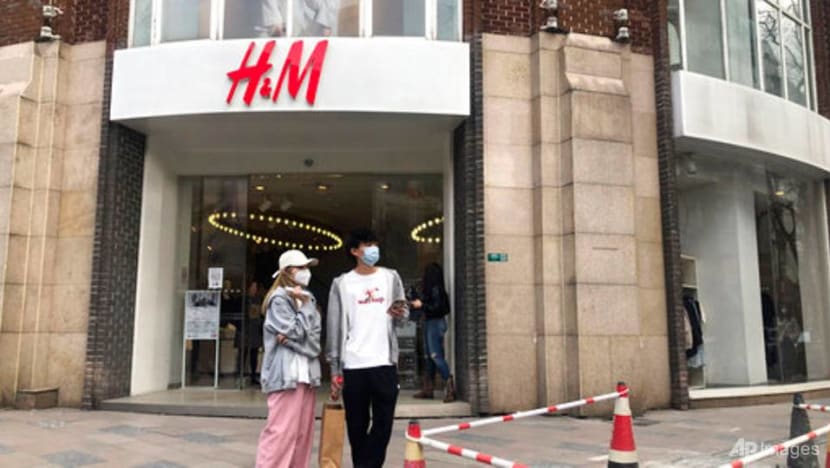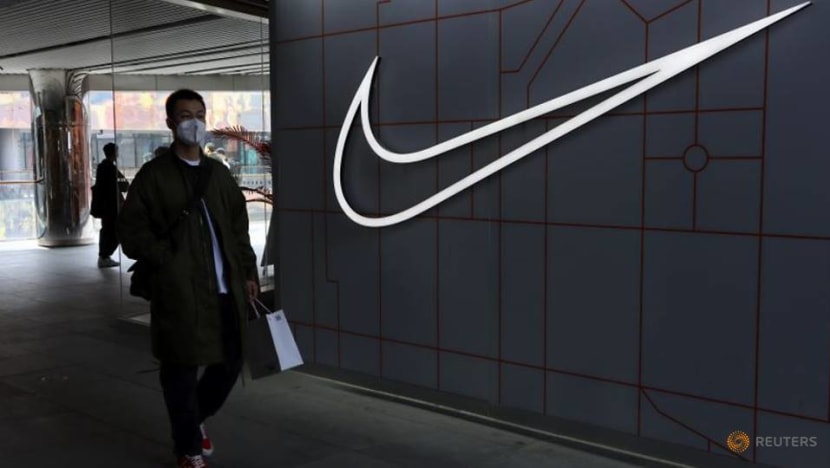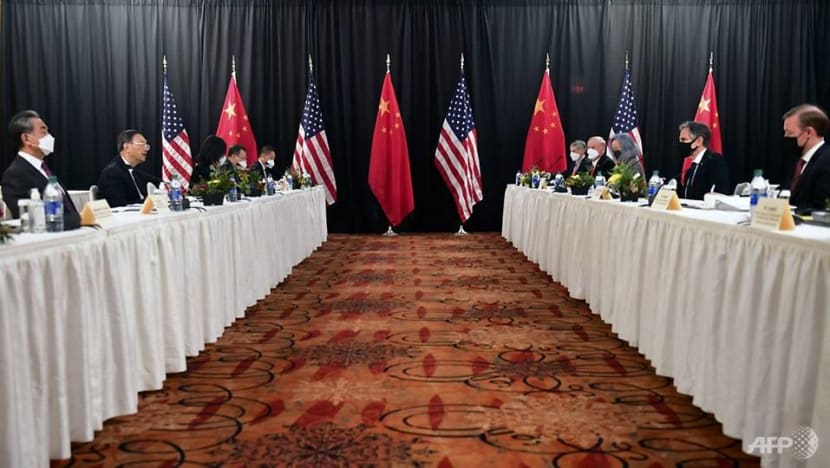commentary Commentary
Commentary: China's boycott of H&M, Nike and other big brands is really bizarre
The timing, response by local authorities and other related developments this week gives food for thought on China’s response, says Professor Bo Zhiyue.

Shoppers stand outside an H&M clothing store in Shanghai, China, Friday, Mar 26, 2021. (Photo: AP/Chen Cici)
SHENZHEN: A day after China had retaliated against the European Union for its sanctions against a few Chinese officials and one entity in Xinjiang, China's Central Youth League called for the boycotting of H&M.
It pointed to the Swedish consumer clothing giant’s statement of not using cotton from Xinjiang in line with the Better Cotton Initiative, the largest cotton sustainability programme in the world.
Mimicking similar terminology by Chinese diplomatic wolf warriors led by Yang Jiechi, one of China’s highest ranking Chinese Community Party politburo members in charge of China's foreign relations, and Foreign Minister Wang Yi, the youth league declared online that "Xinjiang cotton doesn't eat this s***”.
China's state media and netizens quickly joined in the growing Xinjiang cotton campaign. Targets have since been expanded to include major brands such as Nike and Adidas.
READ: Commentary: After Alaska, age of selective engagement in US-China relations begins
READ: Commentary: US-China ties are set to worsen, before they get better
BIZARRE TIMING
What's bizarre about this campaign is that the "patriotic activities" are not well coordinated. The timing of the boycott is puzzling. H&M had made the statement one year earlier, on Mar 20, 2020.
To raise a ruckus over it now throws into sharper focus the fact that Chinese media had been silent on the statement for the whole year.
To add to the confusion, these "patriotic activities" did not seem supported by the security forces.
A woman, who was holding up a sign against foreign products in front of an H&M store in Zhengzhou, was quickly detained by local police. This was in spite of foreign ministry spokeswoman Hua Chunying's public announcement that the Chinese people were allowed to express their patriotic emotions.

Around that same period, on Friday (Mar 26), amid the surging patriotic fervor engulfing the country, Chinese Premier Li Keqiang also reportedly visited a factory in Jiangsu that supplies boycotted companies including Nike and Adidas.
DEFLECTING ALLEGATIONS OF GENOCIDE
On the surface, the campaign appeared to be escalating already heated disputes between China and Europe over Xinjiang.
But a deeper look reveals how the campaign may actually be serving a second purpose of deflecting attention away from the thornier issue of allegations of genocide and crimes against humanity in breach of the United Nation's Genocide Convention.
Branded by the Chinese media as the "common enemy of humankind", Mike Pompeo declared on his last day in office (Jan 19) as US Secretary of State that China was committing crimes against humanity, and specifically, the crime of genocide in Xinjiang.
READ: Commentary: Is China too big to tame? No easy answers to Quad’s central challenge
READ: Commentary: China’s cheap drones are finally taking off, with many uses and huge implications
According to Pompeo, China was intent on destroying ethnic minorities such as the Uighurs in Xinjiang with numerous detention camps and sterilisation programmes involving Uighur women.
Despite a change in party and US President, Pompeo's characterisation of China's policy in Xinjiang has been picked up by his successor, Antony Blinken and has gained traction.
On Mar 9, a newly established think tank in Washington DC, the Newlines Institute for Strategy and Policy, issued a report on Xinjiang prepared by more than 50 global experts in international law. The report claims to have found evidence for violations of every single provision of the UN's genocide convention by the Chinese government in Xinjiang.
At his meetings with Dr Yang and Dr Wang in Anchorage, Alaska 10 days later, Blinken expressed deep concerns of the US and its allies over this issue as well as other matters such as Hong Kong, Taiwan, cyberattacks on the US, and the South China Sea. His brief remarks were countered by a long lecture by his counterpart, Mr Yang.

It was at these meetings that Yang registered his displeasure by famously saying that "we" the Chinese people won't give a damn, or more precisely "we the Chinese people don't eat that s***".
READ: Commentary: After Alaska, age of selective engagement in US-China relations begins
A GATHERING COALITION
Following the heated exchanges in Alaska, Blinken put together a coalition against China over this issue quickly. Altogether, 32 countries condemned China over genocide in Xinjiang, including the US, Canada, Australia, New Zealand, the UK and the 27 countries of the EU.
For the first time in 32 years, the EU sanctioned China over the issue. After China responded by issuing sanctions against 10 individuals (including many members of the EU parliament) and four entities, the EU decided to suspend its review of the China-EU Comprehensive Agreement on Investment.
READ: Commentary: Is China too big to tame? No easy answers to Quad’s central challenge
China now finds itself increasingly isolated in the Western world. From its perspective, this is largely due to the fact that China is rising economically, politically and militarily, and Western countries, especially the US, cannot accept this fact.
But it’s worth recalling that in his recent news conference, US President Joe Biden had acknowledged China's ambitions and was prepared to compete with China in a race.
Ultimately, it does not matter who emerges the economic champion so long as the risk of war is managed. This likelihood must be managed. There cannot be an outbreak of conflict between two nuclear superpowers.
Professor Bo Zhiyue is founder and president of the Bo Zhiyue China Institute, a consulting firm providing services to government leaders and CEOs of multinational corporations.















